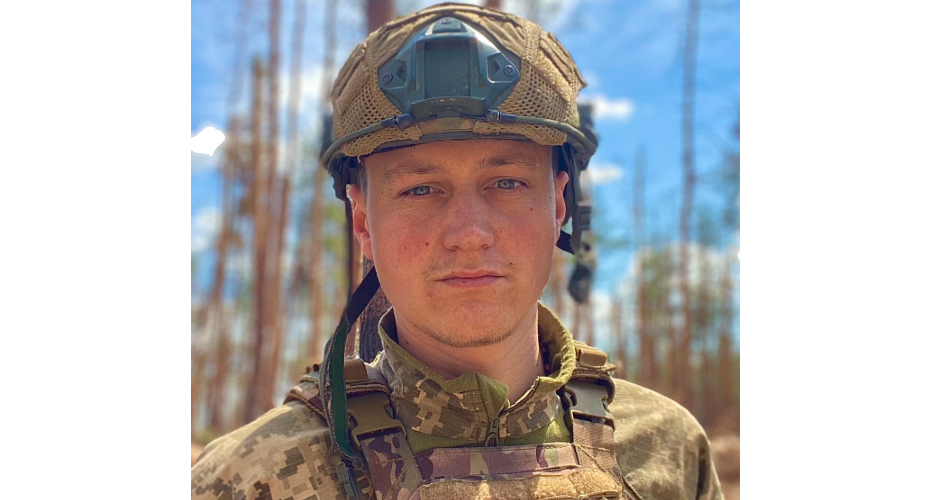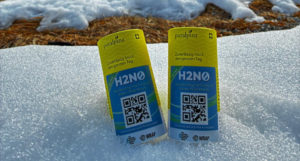Exeter experts support Ukrainian poet and soldier Artur Dron to share experiences of the war from the front line and beyond

Artur Dron has had to endure multiple operations and a nerve transplant after being wounded by shrapnel
Exeter experts are supporting renowned Ukrainian poet turned soldier Artur Dron to share the experiences of those fighting on Europe’s front line.
Artur Dron has had to endure multiple operations and a nerve transplant after being wounded by shrapnel from a Russian anti-personnel mine or a drone that killed two of his fellow soldiers.
His book We Were Here talks of his own experiences on the front line and of the lives of his fellow soldiers and civilians, sharing their voices and perspectives.
The We Were Here editorial team includes University of Exeter academics Hugh Roberts and Helen Vassallo, working with the Devon-based poet Fiona Benson and the young Anglo-Ukrainian poet Charlotte Shevchenko Knight. They have supported its translation and publication in English.
People can attend an Exeter event to mark this edition of the book, where they can hear from Artur Dron and his translator, Yuliya Musakovska, live from Lviv. It will go out simultaneously via Zoom. Yuliya is a fellow Ukrainian poet and cultural advocate for Ukraine.
Artur Dron volunteered to join the 125th Separate Territorial Defence Brigade from Lviv within days of Russia’s full-scale invasion of Ukraine in February 2022. He wrote the book while serving on the front line. He has been described as one of the brightest stars in a new wave of Ukrainian literature inspired by and responding to Russia’s illegal invasion of their country.
Artur said: “A lot of time has passed since the injury, and I feel much better. I’m still undergoing rehabilitation in Lviv. Therefore, I was sincerely grateful for the invitation to present the English edition and gladly accepted it. I believe there’s a lot for us and our English-speaking readers to discuss and to share a moment of silence together.”
Professor Roberts said: “Encountering Ukrainian war poetry by Artur Dron and others has been a revelation. It is an extraordinary privilege to be involved in bringing this work, which I don’t hesitate to place alongside British First World War poets (for example), to an English-speaking readership.
“We Were Here gives voice to the ‘we’ of the title who rose up in defiance of Russia’s invasion. It echoes Volodymyr Zelensky’s words in his famous selfie video from Kyiv, flanked by the Prime Minister and other officials, on the night of 25 February 2022: ‘We are all here. Our soldiers are here. Citizens are here, and we are here. We defend our independence, our state, and we will continue to do so.
“Artur Dron communicates both the experience and the spirit that underpins the defence of Ukraine, at once intensely personal yet also collective.”
Yuliya said: “The Armed Forces of Ukraine is in large part a citizens’ force, which includes many artists and writers like Artur Dron. Tragically, over 200 artists have been killed by Russia. There is an all too clear urgency to reading and hearing from Ukrainian soldier poets.”
The conclusion to Dron’s poem ‘Prayer’ is:
…be
with the two girls
somewhere in the Rivne region, do you remember?
We were driving to the east, in a convoy,
and they stood watching at the roadside,
and put their hands on their hearts.
And then I understood everything.
We Were Here was selected by PEN Ukraine as one of its books of the year for 2023. It has been published in Swedish and Norwegian translation, with French and Polish underway. Yuliya Musakovska edited the Swedish edition, working together with translator Mikael Nydahl, for which he was shortlisted for the Drahoman Prize, celebrating translations from Ukrainian.
We Were Here was funded by a Translate Ukraine 2024 Grant of the Ukraine Book Institute awarded to independent publisher Jantar, to release it as the first in their new Amber Poets series. Michael Tate, Founder-Director of Jantar, will join the launch online.
Fiona Benson’s and Charlotte Shevchenko Knight’s contributions to the editing process were funded by an Arts and Humanities Research Council grant for impact awarded through the University of Exeter.
The event will be held on Tuesday 6 May, from 5.30 to 7pm at the Digital Humanities Seminar Room 1 in the Queen’s Building on the University of Exeter’s Streatham campus and via Zoom.
Tickets are free, but those who feel able may donate to Voices of Children, the Ukrainian charity devoted to supporting children and families affected by war.
Copies of We Were Here will be available to purchase at the reception after the event, courtesy of Exeter bookshop Bookbag.
Those registering to attend online an email with the Zoom link and information on how to join online, as well as a calendar invite, closer to the date of the event.
Register at https://www.eventbrite.co.uk/e/we-were-here-artur-dron-tickets-1306685905719



